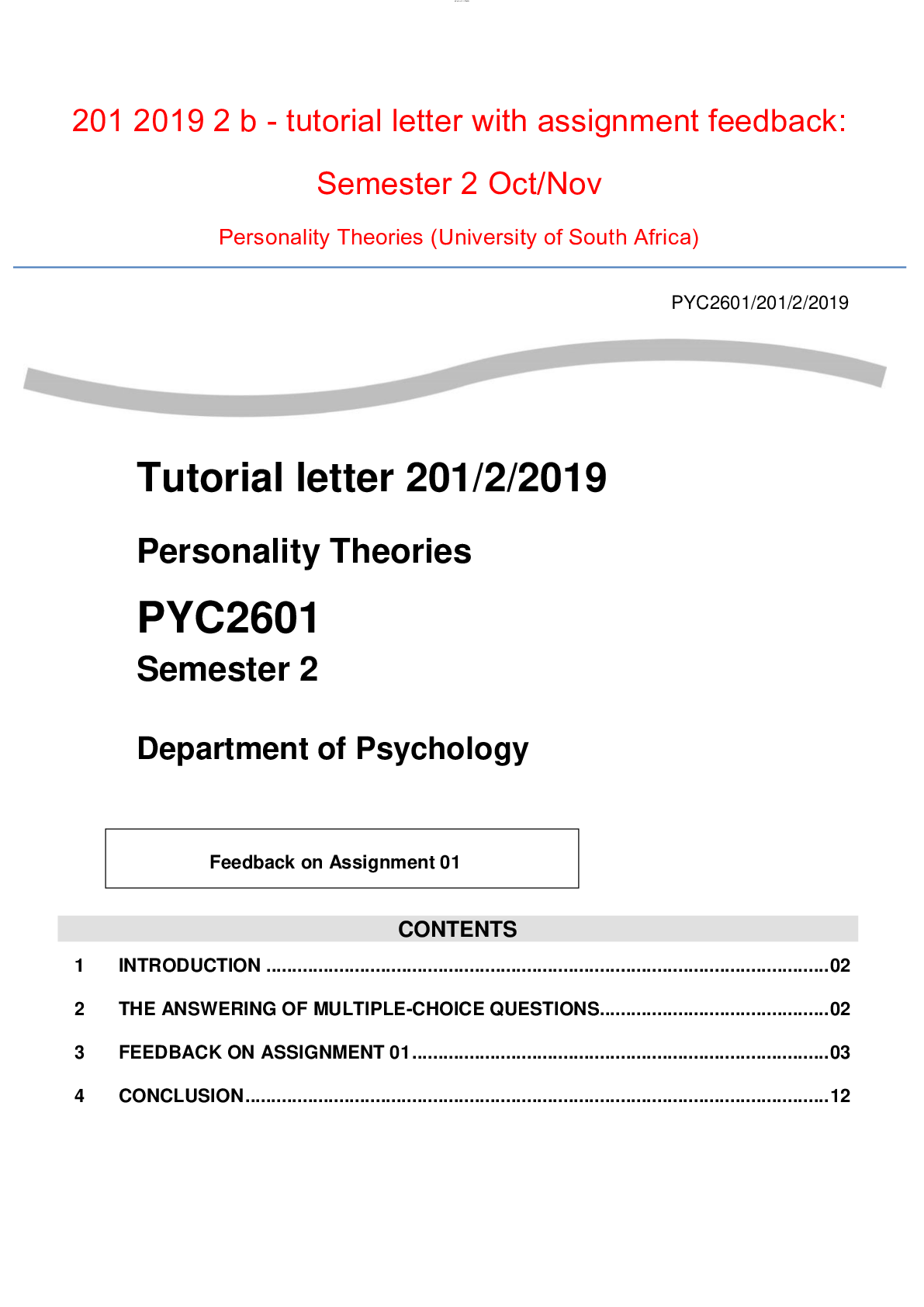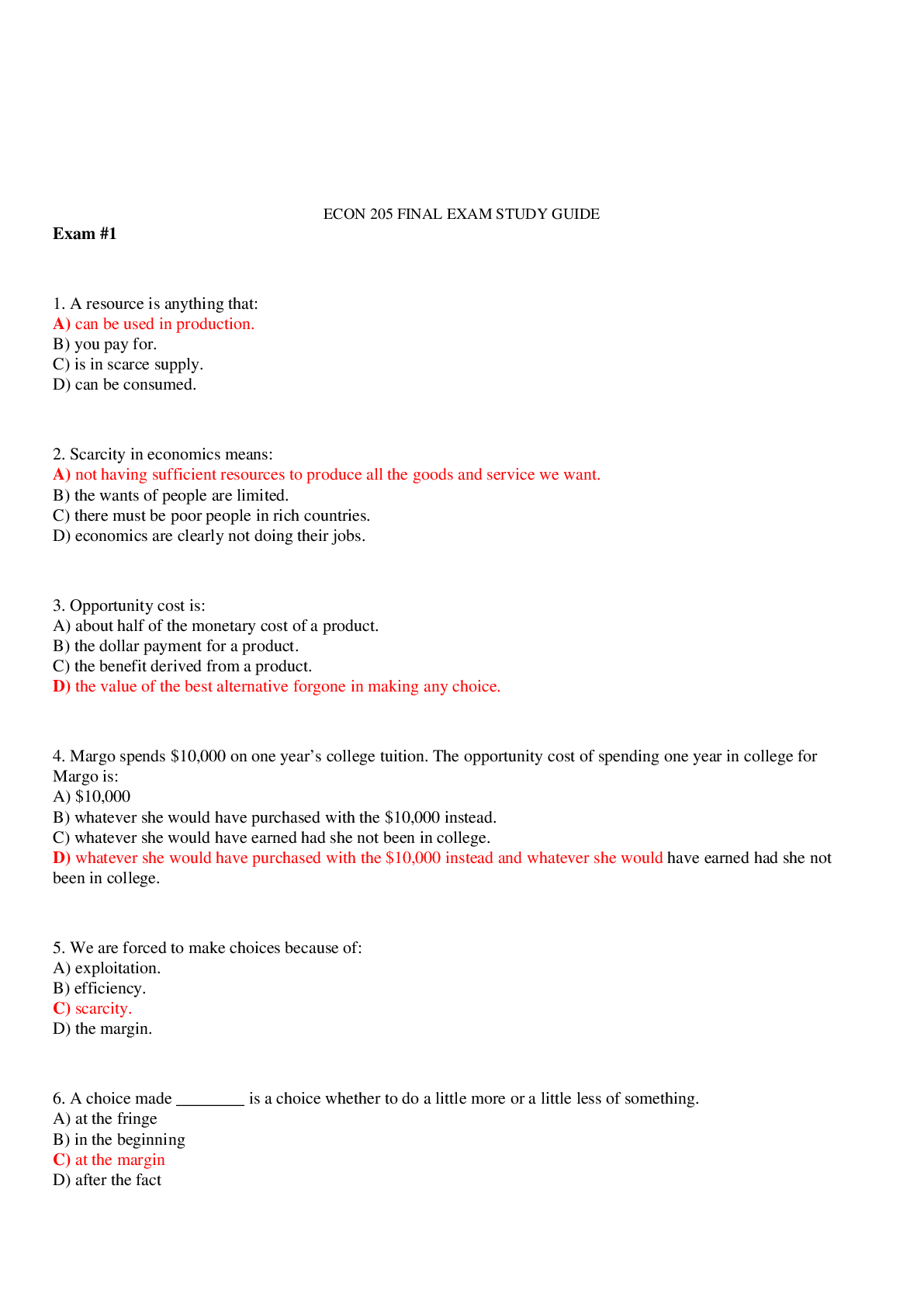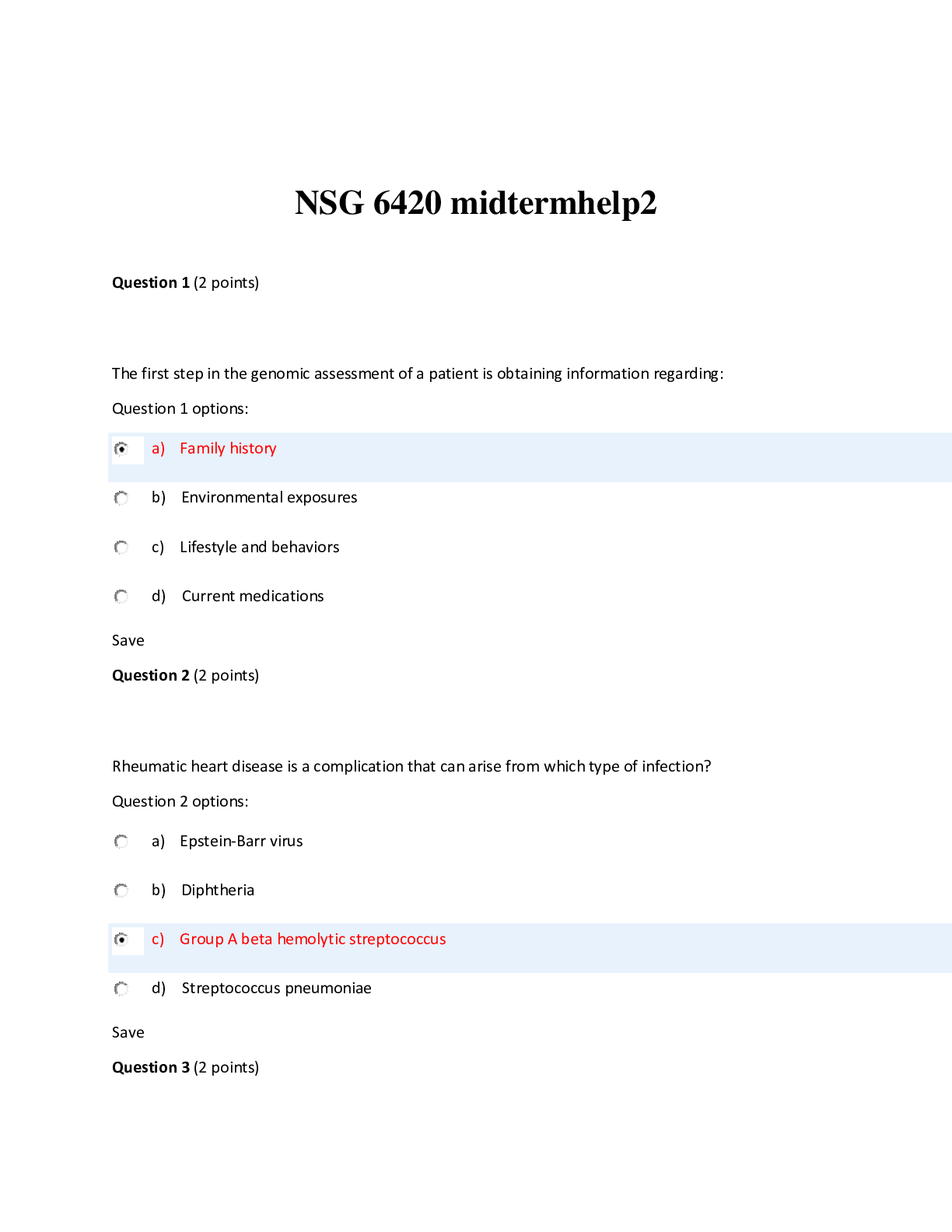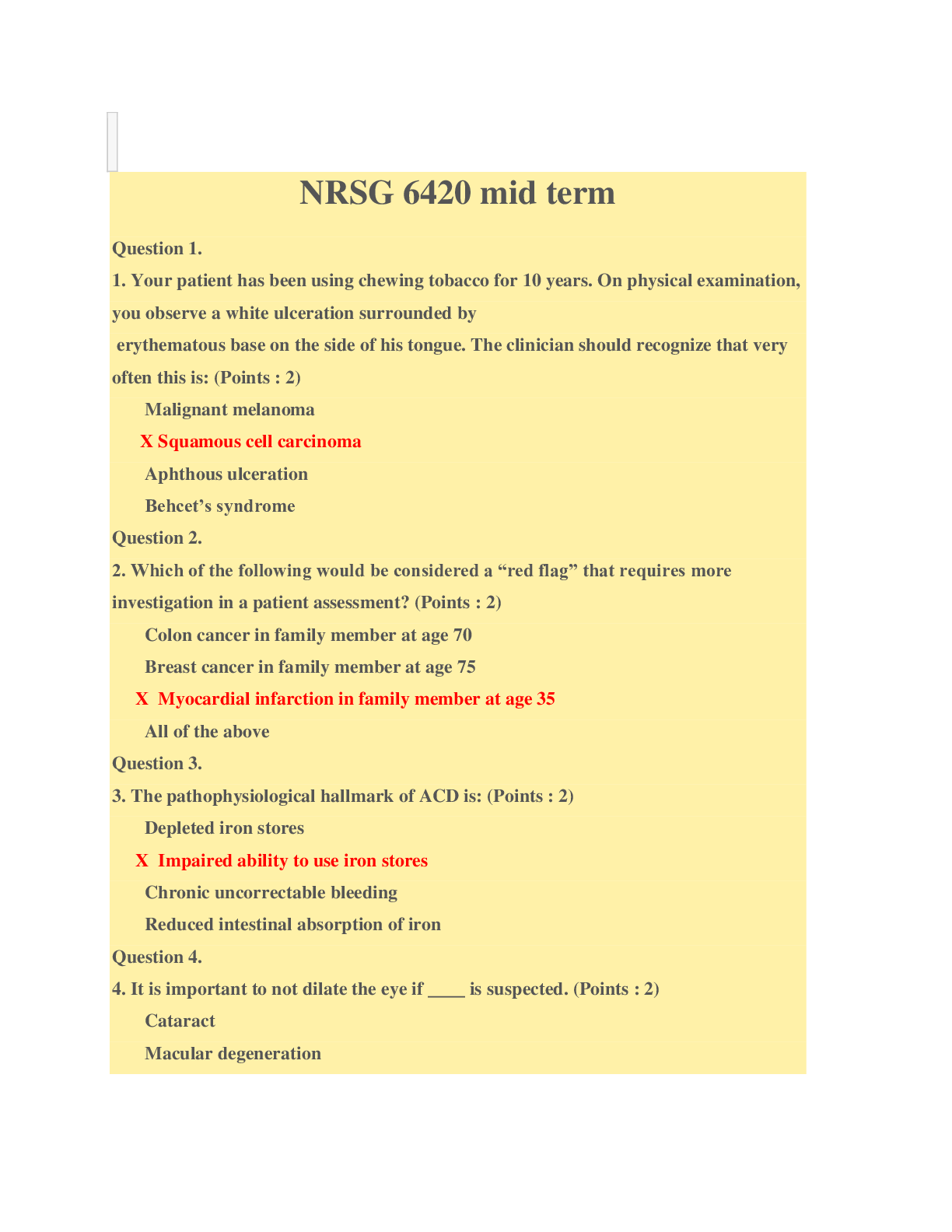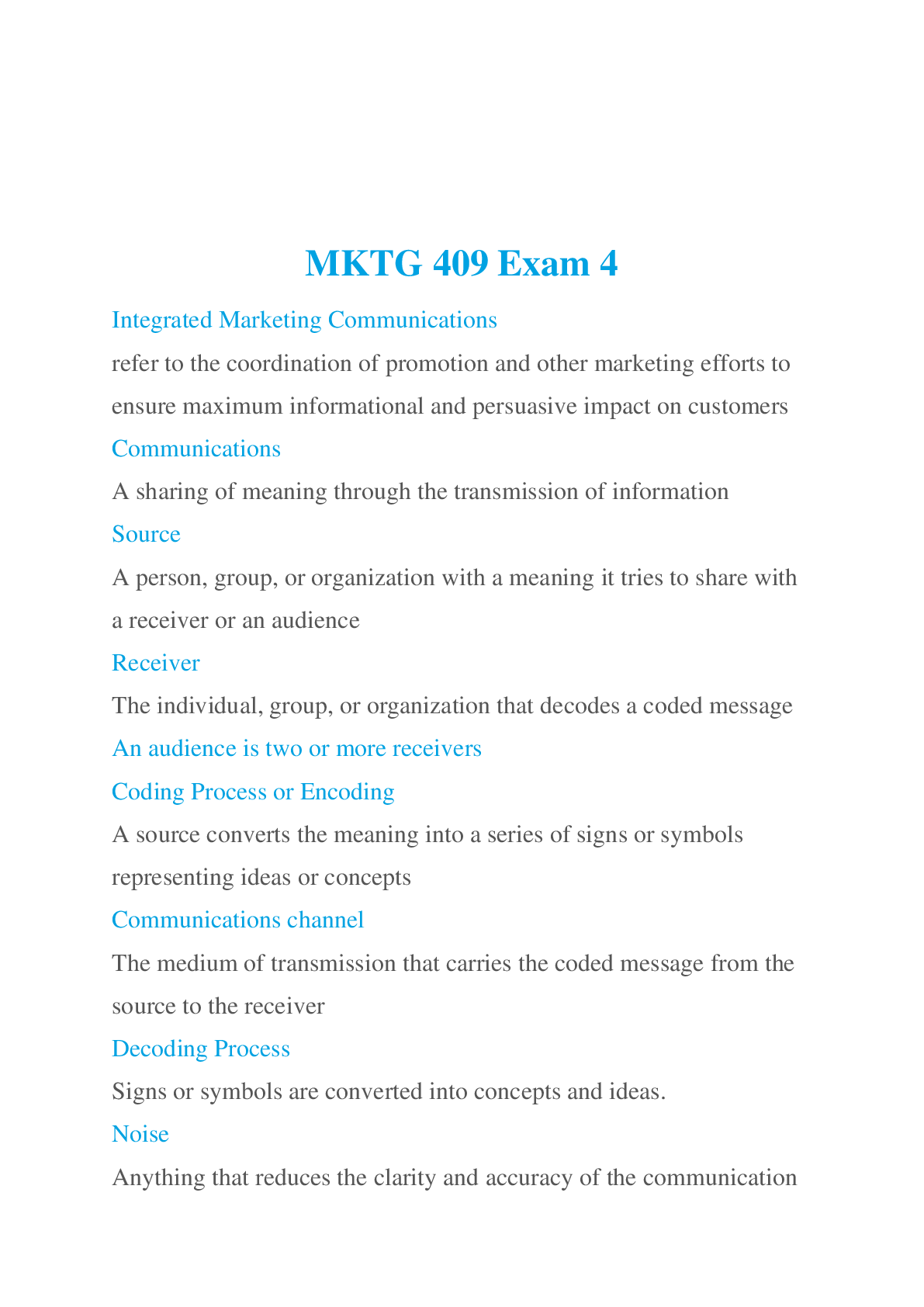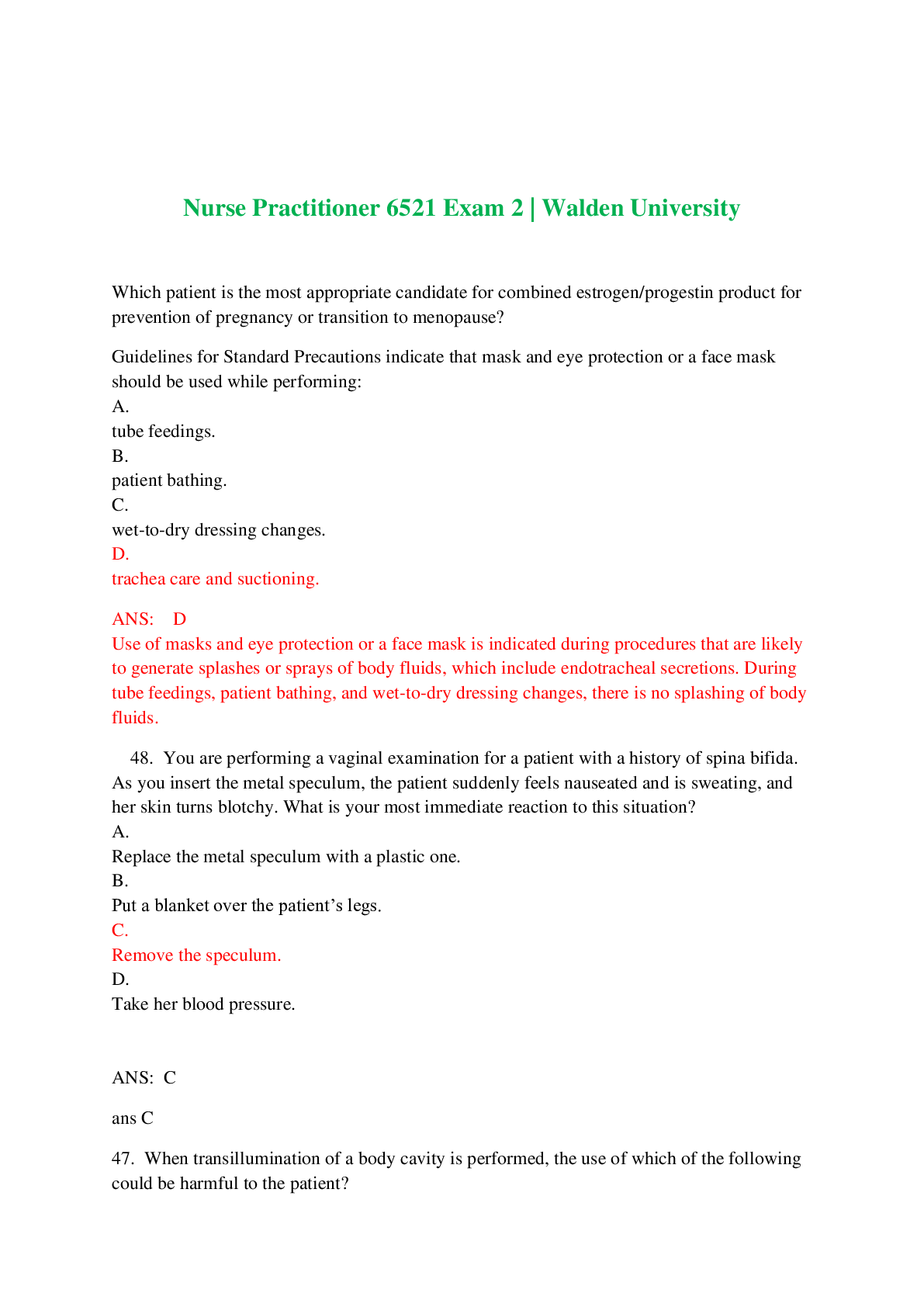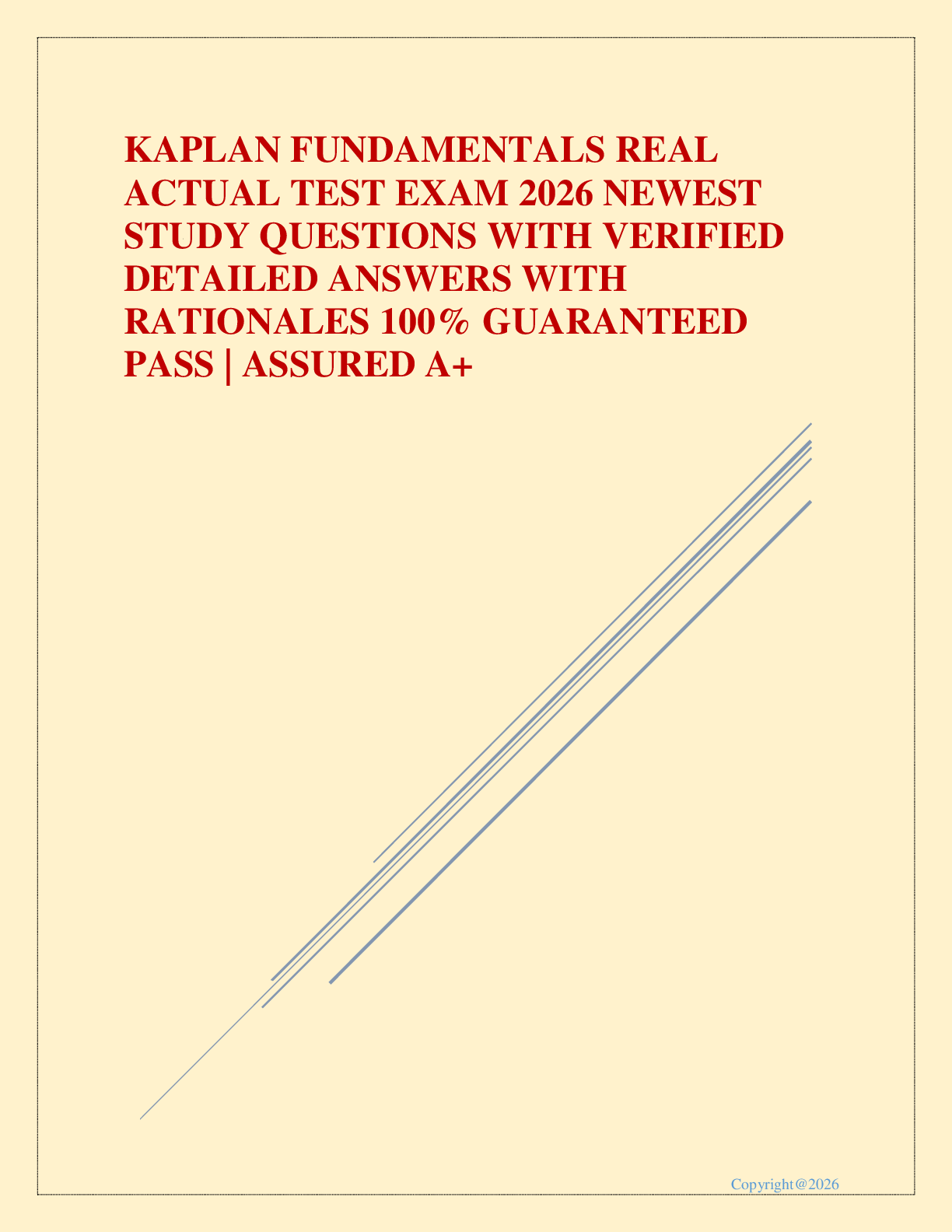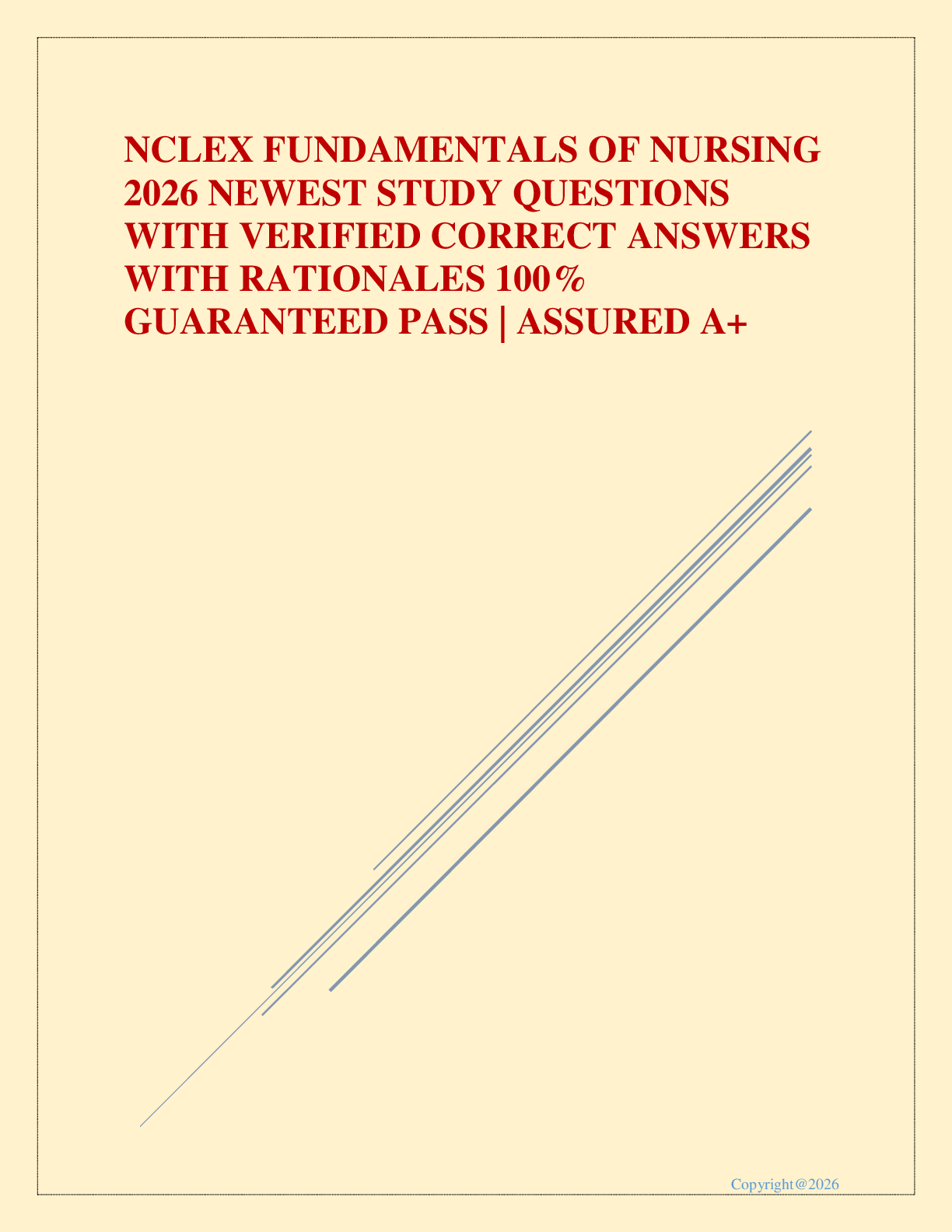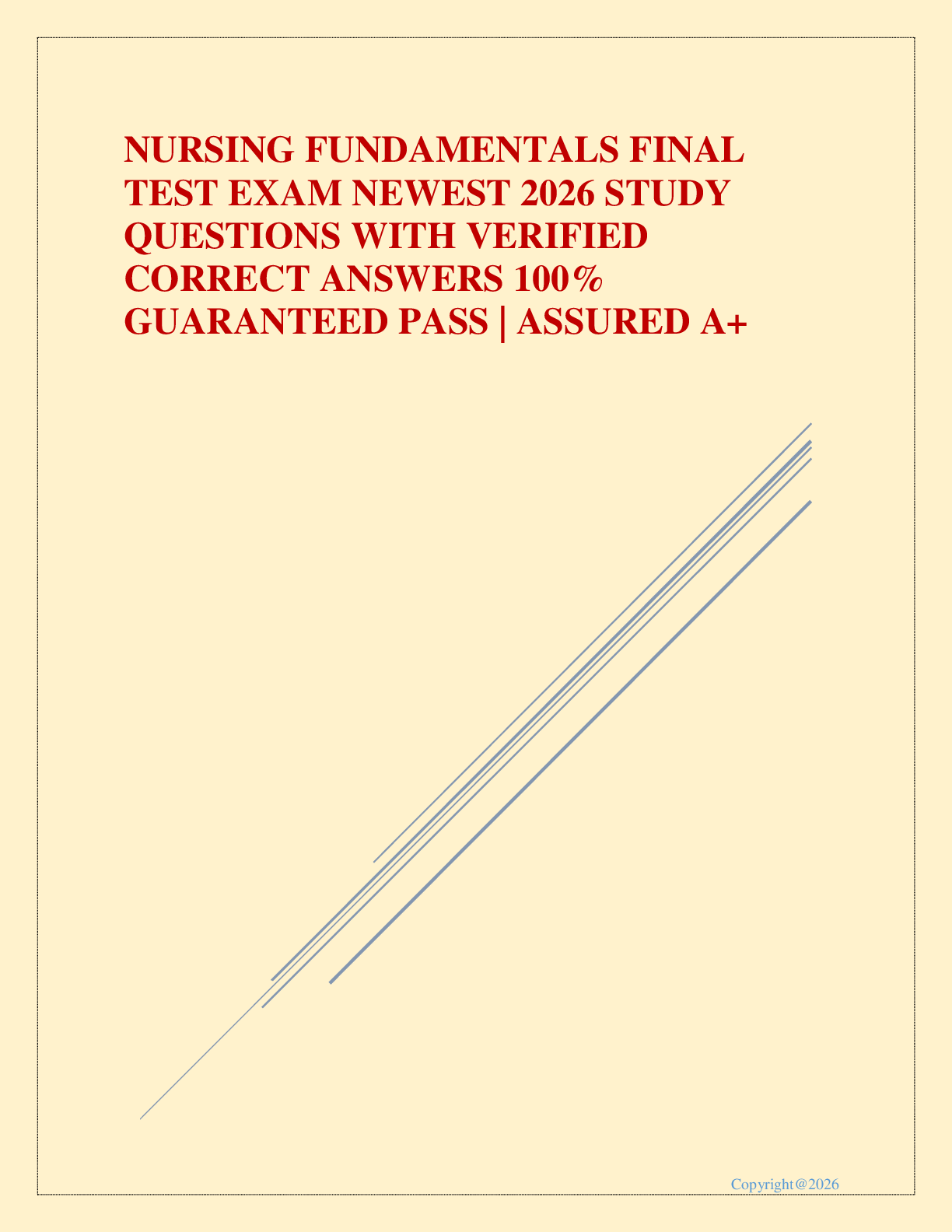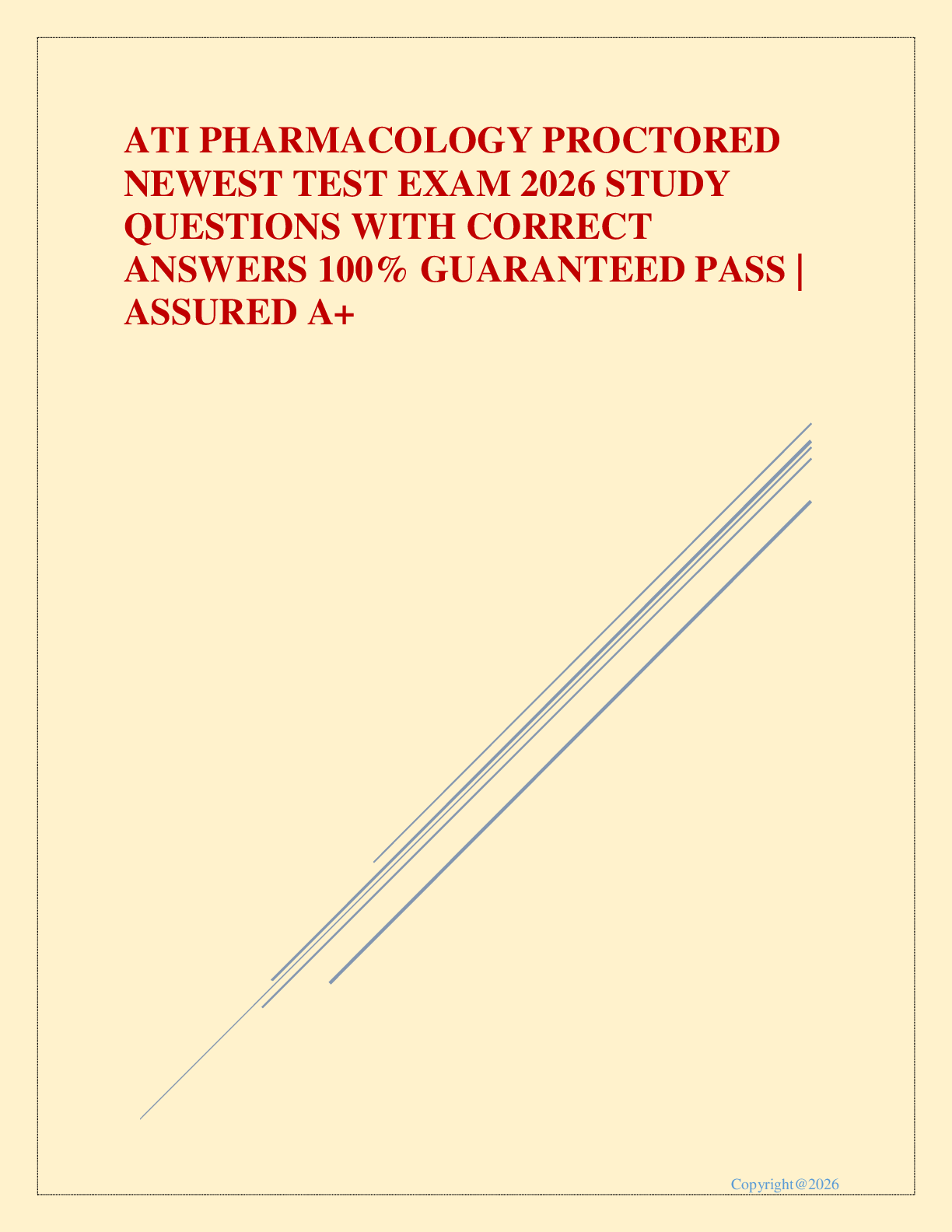201 2019 2 b - tutorial letter with assignment feedback:
Semester 2 Oct/Nov
Personality Theories (University of South Africa)
PYC2601/201/2/2019
Tutorial letter 201/2/2019
Personality Theories
PYC2601
Semester
...
201 2019 2 b - tutorial letter with assignment feedback:
Semester 2 Oct/Nov
Personality Theories (University of South Africa)
PYC2601/201/2/2019
Tutorial letter 201/2/2019
Personality Theories
PYC2601
Semester 2
Department of Psychology
CONTENTS
1 INTRODUCTION 02
2 THE ANSWERING OF MULTIPLE-CHOICE QUESTIONS 02
3 FEEDBACK ON ASSIGNMENT 01 03
4 CONCLUSION 12
Dear Student
1 INTRODUCTION
In this tutorial letter, we will discuss the following: The answering of multiple-choice questions Feedback on Assignment 01.
2 THE ANSWERING OF MULTIPLE-CHOICE QUESTIONS
We hope that the following will help you to answer the multiple-choice questions in this module.
Our aim in using the multiple-choice question approach is to examine how well you have understood the personality theories. While it is important for you to be able to study the facts of each theory and recall them in the exam, it is equally vital that you are able to understand what these facts mean. Hence you need to be able to apply your understanding of the facts of each theory to everyday life. Multiple-choice questions therefore require as much insight, recall and understanding as paragraph questions. Do not be fooled into believing that this is an easier, or for that matter, more difficult way, to be examined.
In addition to factually oriented questions, you will notice that we also frequently use stories in order to test your understanding of the theories. It is our experience that students need to apply both their knowledge and understanding of a particular theory, in order to answer the question within the context of the story.
We do not simply write a story for the story’s sake. Rather, a story is written with a particular theory in mind. For example, some of the stories written with Freud’s theory in mind might centre on the inevitable and on-going conflict between the forbidden drives of the id and the societal expectations internalised in the superego. Stories written within the context of Bandura’s theory might focus on its interactional nature, and the three types of learning and their corresponding reinforcements or punishments, for example.
The story may test your knowledge and understanding of a particular aspect of a theory, that is the view of the person underlying the theory; the structure, dynamics, and development of personality; optimal and pathological functioning; psychotherapy; and the interpretation and handling of aggression; or test your integrated understanding of more than one section.
A useful strategy that you may apply in order to get into ‘multiple-choice question’ mode, is to observe what is going on around you and discuss with a friend how you think the different theorists would explain or interpret that observation. In addition as you study each section of the theory, experiment with formulating your own multiple-choice question/s on that section. The secret is to try and see through the eyes of that theorist.
Another important element to bear in mind is that you should read the stem of a multiple-choice question carefully. By the stem we mean that section in which the story is laid out and/or the question that requires answering is posed. The answer that you select should be correct in terms of the information required in the stem.
For each multiple-choice question therefore, you are provided with 4 alternative answers/unless otherwise specified. The answer you select should fit with the stem and not the theory in general. An alternative may for example contain correct information about the theory, but not answer the particular question. Additional advice that we can share with you on selecting the correct alternative is that sometimes the alternatives contain some correct information and some incorrect information. On other occasions the alternative may only contain a part truth. You can immediately rule out such alternatives, as an answer cannot be half correct and half incorrect! It has to be completely correct. In addition, information, such as the concepts used in a particular question, may actually fit better with a theory other than the one on which the question is based. Look carefully at the terminology. For example, drive satisfaction, belongs to Freud’s theory and would be incorrect if used as an alternative in one of the questions based on one of the other prescribed theories.
3 FEEDBACK ON ASSIGNMENT 01
1. General comments on Assignment 01
We were pleased that most students submitted Assignment 01. Assignment 01 contributes 50% towards your year mark. Assignment 02 further contributes 50% towards your year mark. The aim of Assignment 01 was to help students to work through the first three theories of the syllabus. Students who submitted Assignment 01 will receive a computer printout containing the following information:
(a) The correct answers
(b) Your own answers and
(c) The mark you obtained.
If you submitted your assignment on time and have not yet received such a printout, please contact our Assignment Section by email them at
[email protected] or send a sms to 43584. You will find a summary of the correct answers of Assignment 01 in Table 1.
TABLE 1
ANSWERS TO ASSIGNMENT 01
QUESTION
ANSWER
FREUD:
1
3
2 2
3 2
4 3
5 2
SOCIAL COGNITIVE APPROACH:
6
4
7 4
8 3
9 2
10 4
MASLOW:
11
3
12 1
13 4
14 4
15 3
2. Feedback on the questions in Assignment 01
Each question will now be discussed. The correct alternative will be identified and an explanation will be provided on why it is correct.
QUESTIONS ON FREUD’S THEORY
QUESTION 1
Which of the following statement/s about the development of the ego is/are
INCORRECT, according to Freud's theory?
(a) The ego begins to develop during the first year of life and is fully developed by the age of six.
(b) The ego begins to develop during the first year of life and continues to do so throughout a person's life.
(c) The ego begins to develop during the genital stage and continues to do so throughout the remainder of a person's life.
(d) The ego begins to develop during the first year of life and continues to do so provided the individual does not become fixated at a particular stage.
PYC2601/201
The correct answer is:
1) (b)
2) (a) & (c)
3) (a), (c) & (d)
4) (c) & (d)
FEEDBACK ON QUESTION 1
QUESTION 2
Last week Tuesday things went terribly wrong for Ntswaki at work. W hen she got home she attacked her husband and their children verbally for no apparent reason. The following day she accused them of being mean and inconsiderate. W hat defence mechanism was Ntswaki using according to Freud?
1) Rationalization
2) Projection
3) Displacement
4) Reaction formation
FEEDBACK ON QUESTION 2
QUESTION 3
According to Freud, one of the differences between healthy and psychologically disturbed people is in the types of defence mechanisms the two employ to cope with psychic conflicts. Compared to disturbed individuals, psychologically healthy people are more successful at employing the defence mechanisms of
1) displacement and identification
2) displacement and sublimation
3) reaction formation and sublimation
4) identification and rationalisation
FEEDBACK ON QUESTION 3
QUESTION 4
Margie visits a therapist about her sudden compulsion to clean everything in sight. She cleans her house twice a day and cannot relax if there is so much as an unwashed plate in sight. She tells the therapist she is a devoted Christian and enjoys a close, warm relationship with her boyfriend. Although the couple is comfortable about their decision to abstain from sexual relations until after marriage, Margie's compulsion for cleanliness and neatness is causing disunion in the relationship. According to Freud, Margie could be described as experiencing
1) reality anxiety
2) neurotic anxiety
3) neurotic and moral anxiety
4) moral anxiety
FEEDBACK ON QUESTION 4
QUESTION 5
Mr W ilson is described by his colleagues and staff as a perfectionist and a shrewd businessman who has an amazing knack for saving his company vast sums of money. He is methodical, organised and meticulous. According to Freud, Mr Wilson could be described as having a/an
1) genital personality
2) anal personality
3) oral personality
4) latent personality
FEEDBACK ON QUESTION 5
QUESTIONS ON THE SOCIAL COGNITIVE THEORY
QUESTION 6
Which one of the following statements concerning observational learning is INCORRECT?
1) The imitation of behaviour is determined by the consequences of the model's behaviour, and the observer's cognitive processes.
2) Behaviour is acquired when the observer observes the model's behaviour and regards the results of that behaviour positively.
3) Observational learning entails vicarious reinforcement, which means that the observer's responses are positively reinforced.
4) Learning takes place through active elimination or weakening of undesirable behaviour by means of aversive counter-conditioning
FEEDBACK ON QUESTION 6
QUESTION 7
Boitumelo has just been informed about the death of her sister. Immediately after that, she is called to the office by her manager, who knows nothing about her situation. Her manager informs her that she has been promoted to a senior position (that she has been looking forward to for many years but could not be promoted due to limited opportunities for upward mobility in her firm). To her manager’s surprise, Boitumelo shows no signs of excitement but instead just shakes her manager’s hand, thanks him and leaves the office.
In terms of the social cognitive learning theory, reciprocal determinism is clearly indicated in this story. This means that
1) regardless of the situation, people show a set pattern of individual differences.
2) all behaviour and learning can be explained without any reference to needs or conscious experiences.
3) differences in behaviour are chiefly or exclusively attributed to the influence of the situation.
4) there is an interaction between the person, the situation and the person’s behaviour
FEEDBACK ON QUESTION 7
QUESTION 8
Simon belittles his wife, Kim, in front of their friends. Instead of the support that Simon expects from the men, they side with his wife instead, and Simon feels rather embarrassed at his behaviour. Barry, who witnesses this, decides never to humiliate his wife in front of others. In terms of social cognitive learning theory, Barry’s decision is an example of
1) imitation.
2) M o d e l l i n g
3) counter-imitation
4) punishment.
QUESTION 9
According to the social cognitive learning approach, an optimally developed person is someone who
(a) has a realistic self-efficacy perception.
(b) recognises the factors that are relevant for effective functioning within a particular situation.
(c) is able to regulate own behavior by using own standards.
(d) demonstrates behavior that fits a specific cultural context The correct answer is:
1) (a) & (b)
2) (a), (b), (c) & (d)
3) (c) & (d)
4) (a) & (c)
FEEDBACK ON QUESTION 9
QUESTION 10
Which person/s function/s optimally according to the social cognitive learning approach?
(a) Clare learned most of her behaviour through observational learning and she functions only by receiving positive reinforcers.
(b) John has a realistic self-efficacy perception and neither overestimates nor underestimates his own abilities.
(c) Doreen lives a very satisfactory, fulfilled and happy life of tension reduction, drive reduction and homeostasis through effective use of defense mechanisms.
(d) Mary demonstrates respect for the standards held by members of her society. The answer is:
1) Clare
2) John
3) John, Doreen and Mary
4) John and Mary
With your understanding of optimal development still clear in your mind, one cannot function by only receiving positive reinforcements, which rules Clare out as an optimally developed person. Most of the concepts used in alternative (3) are foreign to the social cognitive learning framework and therefore cannot be correct in this case. Optimally functioning individuals do not rely on defense mechanisms to learn and grow. This then rules out Doreen as an optimally functioning person. John and Mary can be classified as optimally functioning individuals according to Bandura’s explanation of the concept of optimal development. Alternative (4) is therefore the correct answer.
QUESTIONS ON MASLOW ’S THEORY QUESTION 11
Which one of the following statements correctly reflects Maslow’s view?
1) Self-actualisers tend to be autocratic since they are functioning on a higher level than most people.
2) Self-actualisers are achievers who will use any means to reach the high goals they have set themselves.
3) Self-actualisers function relatively independently of their physical and social environment.
4) Self-actualisers are sociable people who like to have constant contact with other people.
FEEDBACK ON QUESTION 11
QUESTION 12
According to Maslow, the person who functions optimally
(a) can meet his or her deficiency needs regularly.
(b) has accepted the responsibility of self actualisation.
(c) is functioning at the level of self-actualisation. The correct answer is:
1) (a), (b) and (c) 2) (b)
3) (a) and (c)
4 (a)
FEEDBACK ON QUESTION 12
QUESTION 13
According to Maslow, self-actualisation is not always attained because
(a) most people evade responsibilities and shy away from the challenge to realise their talents and work towards self-actualisation.
(b) the social environment can place obstructions in the way of a person’s growth towards self-actualisation.
(c) it is a developmental achievement which only exceptional people attain. The ordinary person does not feel the need to function on the higher levels of self- actualisation.
(d) most people have poor self-knowledge and do not know what they are capable of and consequently fail to realise their potential.
The correct answer is:
1) All of the above 2) (b), (c) & (d)
3) (c) & (d)
4) (a), (b) & (d)
QUESTION 14
Maslow believes that meta-needs
(a) must be fulfilled to ensure maximal growth
(b) unlike basic needs, are not innate
(c) if unfulfilled, can also lead to pathological conditions
(d) refer to self-actualisation
The correct answer is:
1) All of the above 2) (a) & (d)
3) (b) & (c)
4) (a), (c) & (d)
FEEDBACK ON QUESTION 14
QUESTION 15
Which one of the following statements relating to Maslow‟s conceptualisation of self- actualisation, is INCORRECT?
1) Even though self-actualisation has been achieved, a severe set-back in life may cause regression to a lower level of need.
2) Self-actualisation is a growth need which leads to fully-functioning, goal oriented being.
3) The fulfilment of basic needs will lead to the next step, namely, the achievement of self - actualisation.
4) A person may have fulfilled every deficiency need, yet feel restless and unhappy.
FEEDBACK ON QUESTION 15
END OF FEEDBACK OF ASSIGNMENT 01 FOR SECOND SEMESTER
4. CONCLUSION
YOUR LECTURERS FOR PERSONALITY THEORIES
